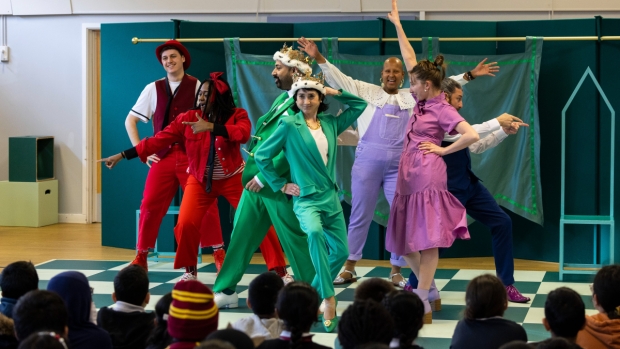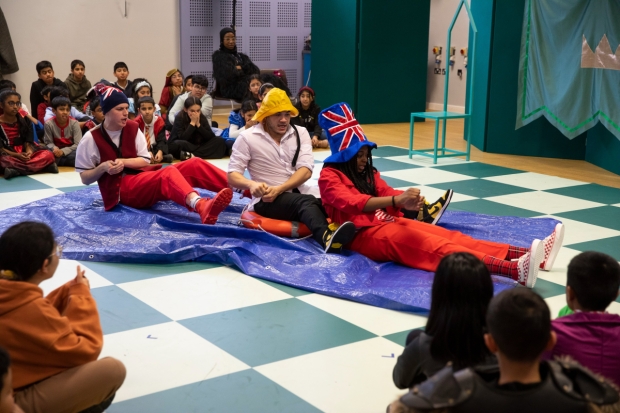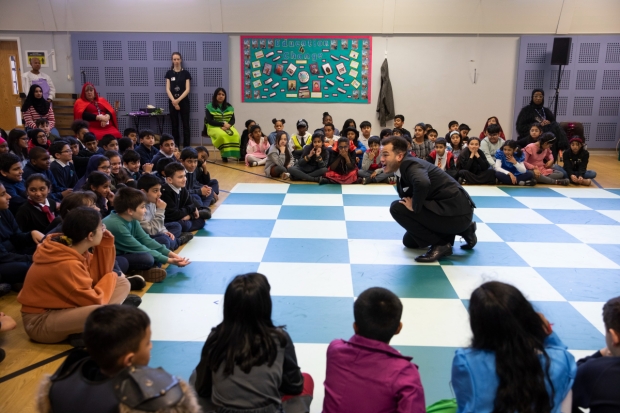"To thine audience be true" – Tinuke Craig on taking Hamlet to primary schools across the UK
Craig directs the reimagined version of Shakespeare’s tale, adapted for younger audiences, which will also run at the Dorfman later this month

© Ellie Kurttz
Shakespeare turns up in most of our educational lives at some point. For many of us, it's a dry reading in a classroom, or a wheeled-in video of a long-dated production. Often we experienced Shakespeare at school in the same way we experienced bitter medicine or long church services – as hardly enjoyable, maybe even actively off-putting, but with grownups saying it's "good for you" and that it'll pay off in the long run. If lucky, we might have been taken to see some live Shakespeare, but even this could be a tough experience if you weren't a regular theatregoer, or sure of the etiquette, or if other people in the audience gave you stern looks. Add three hours of iambic pentameter and is it any wonder most people aren't bitten by the theatre bug during these experiences?
So. How to give 8 to 12-year-olds a first experience of Shakespeare? This is Hamlet's second outing (it first ran in 2020), and while I'm still learning, so far here's what I've got:
1. Lose the reverence and cut it.
Jude Christian has skilfully extracted the plot from the four-hour long tragedy and created a script that runs at an hour. Some words have changed (why say ‘blench' when ‘flinch' makes more sense and still fits the meter) but it's still about 75% Shakespeare. At this length the introspective play becomes a thriller, with its hero ricocheting from wedding to ghost to murder to duel in a record time that surprises even him. The momentum keeps our young audience with us. They don't need it all (do any of us?), they need the bits that compel (don't we all?). The ‘boring bits' can be introduced later (even then, must they?).
2. Play on their home turf
Although the production will play the Dorfman at the National Theatre for three weeks for schools and families, the bulk of the run is a four-week tour to state primary schools around the country, reaching over 5,000 young people. It's a gesture that says "This is for you. Theatre can happen in your town, in your school." Sat in their hall, the children are comfortable, with peers, it's not dark, and the actors are up close. The engagement is incredible. It's made me only ever want to watch Hamlet with people who've never seen it before. An indignant "disgusting!" when Hamlet tells us his Mum has married his uncle? Fair enough! The entire audience gasping when Gertrude drinks the poison? You don't get that in the Olivier where everyone already knows she's gonna do it. And watching the duel with an audience who have no idea what happens reminds us what an exciting play it is. Like actually exciting, for real.

© Ellie Kurttz
3. Get them involved
In our production the audience are asked to participate, to help Hamlet out. They sing and clap along to the songs (it's a bit of a musical now), yell "murderer!" at Claudius, one child makes a cameo as the King of England (it'll make sense if you see it). Additionally, we prepare the audience for the show and let them debrief afterwards. NT workshop leaders work with our audiences on the themes of Hamlet before they see it (no spoilers, of course), and each show is followed by a Q&A where the audience can ask the company anything they like. A fully rounded experience.
4. This above all: to thine audience be true
You can't make work for kids if you don't care deeply about them. During rehearsal we would regularly say "but imagine being nine". Now is not the time for ego, for clinging to some couplet you adore, or over indulging in a soliloquy. If you were nine, would you care? We made a list of ‘Key Stage 2 Kryptonite' (what in the show would elude or upset or bore you at that age?) to be fixed, changed or cut. Surprisingly, it wasn't as long a list as you'd think. There's a lot in Hamlet for 8 to 12-year-olds to connect with. They know what it's like to feel stuck, or like your friends aren't being truthful, or like your Dad is overprotective, or like this new guy your Mum is seeing isn't to be trusted. Some of them know grief, fiercely and intimately. Our audience is not to be underestimated. They can take dark themes, complex issues, and even Elizabethan language – you just have to remember you're there to serve them and meet them where they are.

© Ellie Kurttz
Hamlet is scheduled to play the Dorfman Theatre from 24 March to 6 April 2022, as well as touring to state schools in Liverpool, Wolverhampton, Sunderland and South Essex to introduce children and young people to theatre.












